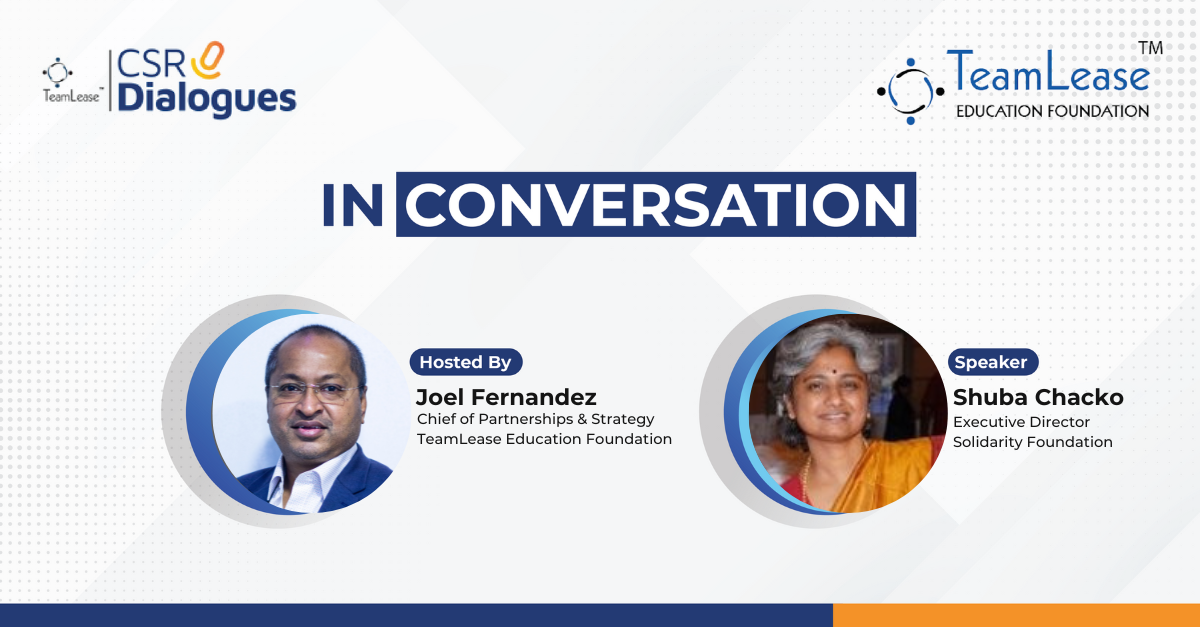
Gender Inclusivity in the Workplace: Subha Chacko
After a long struggle, including various movements and demonstrations in different parts of the globe, several nations, including India, have officially recognized third sex and homosexuals as equal citizens.
The Preamble to the Constitution of India recognizes its residents without prejudice by referring to them as “We the people of India,” It guarantees social, economic, and political justice. The corporate sector, too, has a role to play in achieving these goals, particularly through Corporate Social Responsibility (CSR) initiatives.
The ruling to legalize adult same-sex weddings based on consent was handed down by the Supreme Court of India in September 2018 as part of its review of Section 377 of the Indian Penal Code. In terms of its comprehensive interpretation of constitutional rights and the empowerment it bestows to the LGBTQIA+ community; this judgment is widely regarded as a historic moment. Even while it was a significant step forward, this does not imply that LGBTQIA+ individuals in India have complete freedom or are regarded on the same level as the rest of India’s residents. It diminishes the significance of the enormous work that must be accomplished in India and everywhere else worldwide.
To discuss the topic further, TeamLease Education Foundation invited Shuba Chacko, Executive Director at Solidarity Foundation for a one-on-one discussion on the topic ‘Gender Inclusivity in the Workplace: Inclusivity beyond Gender.’ Joel Fernandez moderated the session, where they discussed the role of CSR in promoting gender inclusivity in the workplace.
The difference between ‘gender’ and ‘gender identity’
This difference between gender and gender identity starts with the issue of sex. When a baby is born, the first thing that the doctor announces is if it’s a male or female child, based on the physical examination of the genitalia. But oftentimes people don't fit this clear box of male and female. The sex assigned at birth is gender but what they portray themselves as is called gender identity. CSR initiatives can help in creating awareness and sensitizing the public and private sectors to be more inclusive of individuals who do not fit into the traditional boxes of male or female.
Watch the full conversation here
LGBTQIA+ community in corporate space
Sometimes the intent is good, but just have to check with policies. What is the policy against sexual harassment in the workplace? How inclusive? Do we have toilets that people can use across genders? What are our benefits? Do same-sex partners get the same benefit? What are our policies and practices?
So there are a lot of questions that corporate India has to answer before calling them inclusive. Watch the full conversation here
CSR playing play a role to change the mindset of the Indian corporate workplace
Subha Chacko and her organization put together a proposal and an idea of working with a range of public sector enterprises to sensitize them about the community. This is a way to start healthy conversations. Through CSR we can work on the employment and service perspective and once we get into the system, then it picks up some momentum.
CSR helps start training centres, teaching various vocational courses like tally, design, computers, and English. Watch the full conversation here
What needs to be done to include more LGBTQI+ community members at the middle and senior leadership levels?
Some people and companies are trying to make efforts and are pushing forward. Like having a vacancy open to all, or celebrating Pride month. Putting out the message loud & clear for the community to see and apply there. Mentoring and reverse mentoring, both play an important role in the community people to move into certain roles. A bond needs to be created between junior and senior employees like a two-way street. And not to forget the culture of the organization to welcome and make the community member feel welcome and heard. In conclusion, achieving gender inclusivity in the workplace requires a collective effort from society and organizations. Through CSR initiatives, the corporate sector can contribute to achieving complete freedom and equality for the LGBTQIA+ community in India.
Watch the full conversation here
Don’t miss the full session between the leaders. See all videos here.





